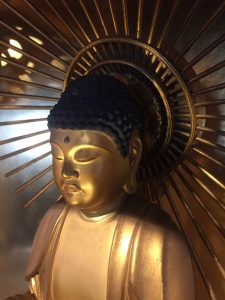
If you have a question, please email us at info@higashihonganjiusa.org. You also can post questions on our Facebook page “Shinshu Center of America.”
How is Buddhism relevant to my life?
Before the Buddha attained enlightenment, he suffered the pain of losing his mother, who died in childbirth. He lived a life of luxury, yet found no happiness. Only after he understood the true reality of life was he liberated from suffering. Similarly, Shinran Shonin, founder of Jodo Shinshu, could not find fulfillment until he understood himself, guided by the Buddhist teachings. Buddha means “awaken to truth” and “dharma” means “teachings.” Buddhism is the teaching that awaken us to Truth. The Dharma helps guide us towards understanding our true selves. It is a path of self-reflection. The Buddhist teachings encourage us to examine our selves, to understand the nature of suffering and to realize that there is a path to spiritual awakening.
Buddhism helps us understand great Truths that are universal for all people, such as the truth of impermanence (how life constantly changes), the truth of interdependence (how all things in life are connected and reliant on each other), and the truth of Oneness, and ultimately how to see our lives as part of a more connected and greater Life.
How is Jodo Shinshu different than other kinds of Buddhism?
All forms of Buddhism trace their origins back to the historical Shakyamuni Buddha who lived in India 2,600 years ago. From that time through the present, the Buddha’s teachings have been interpreted and taught by various teachers, especially as Buddhism spread to different countries. Jodo Shinshu Buddhism sprung from the teachings of Shinran Shōnin (1173-1262), who lived in Japan about 800 years ago. Shinran came to a deep spiritual realization through the Pure Land tradition of Buddhism. He found that wisdom rooted in a lineage of teachers from Japan, China and India, ultimately originating with Shakyamuni Buddha. Shinran’s teachings became known as Jodo Shinshu, “true essence of the Pure Land,” which at its core, express the Buddha’s teachings.
Shinran viewed others as “fellow travelers,” welcoming all and teaching everyone equally, not discriminating based on age, sex, education, income, or class. He understood we all struggle with shortcomings and ignorance, but that the Buddha’s wisdom shines everywhere on everyone. Jodo Shinshu is considered the people’s Buddhism. There are no strict or severe practices. Merely listening to the Buddha dharma (Buddhist teachings) and reflecting on one’s life are enough.
What happens at your temples? What services do they provide?
Our temples first and foremost serve as a place to hear the Buddha Dharma, the Buddhist teachings. Regular services, typically held Sunday mornings, consist of incense offering, short recitations, Dharma talks to children and adults and gatha singing. Lectures and seminars on Buddhism are held periodically, as well as regularly scheduled classes and discussion groups. There are special services for New Year’s Day, the Buddha’s birth, Obon (summer memorial), the Spring and Fall Equinox, and Shinran Shonin’s memorial, as well as personal family services for weddings, funerals and memorials. Other activities include summer bazaars, picnics, and youth activities. These events help us appreciate the Buddhist teachings, strengthen our sense of Sangha (community), and teach us universal truths such as interdependence, Oneness and impermanence. Please contact your local temple for more information.

